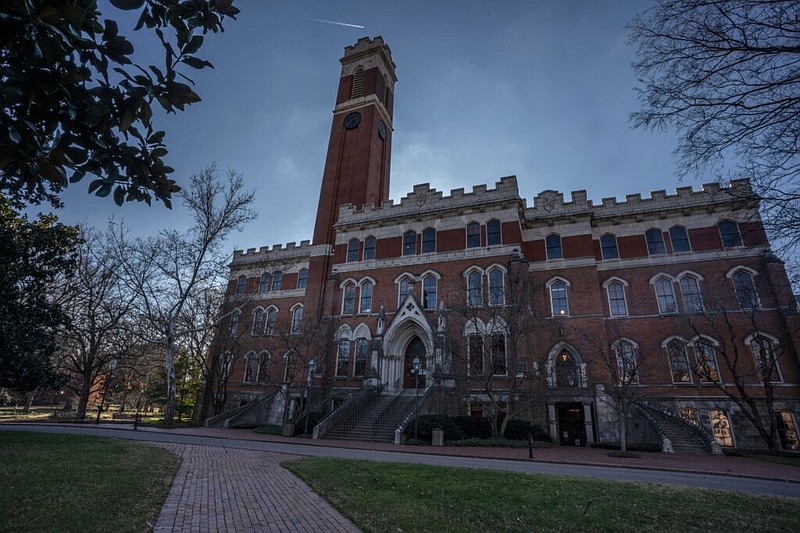Vanderbilt University has lost four doctoral students in the biomedical sciences program to suicide in the past two years, according to interviews with students and emails from the university.
The deaths have added stress in a community of only a few hundred students already struggling with intense professional pressure and heightened the demand for counseling during the isolation brought on by the pandemic. Mental health services are so strained that some students say they can't keep up and face lengthy waits.
Health challenges posed by COVID-19 include increased rates of anxiety and depression reported across the U.S., specifically by people 18-29. Rates of suicide have steadily increased over the past decade, according to the American Foundation of Suicide Prevention.
On Dec. 7, U.S. Surgeon General Vivek Murthy issued a 53-page advisory detailing what he characterized as a youth mental health crisis, as well as ways to address its challenges. Campuses including Dartmouth and the University of North Carolina at Chapel Hill have experienced sharp increases in students reporting declining mental health. Like Vanderbilt, both campuses reported multiple deaths by suicide since the onset of COVID-19 in 2020.
In a statement, Vanderbilt said it "is committed to a culture of caring in which the well-being of all community members - our extraordinary students, the faculty who teach them and the staff who play an immeasurable role in the success of the university - is enhanced and supported. We strive to foster a culture of openness through brave dialogue and honest self-reflection by investing in the mental health and wholeness of every member of the Vanderbilt family."
(READ MORE: Tennessee's Gov. Lee renews $250 million for K-12 mental health trust fund)
Official communications from Vanderbilt have not directly acknowledged the deaths by suicide, which occurred in 2020 and in the fall of this academic year.
Campuswide emails about the passing of a student typically include cause of death, unless it is suicide. Last fall, the university mailed copies of "A Year Like No Other" to students and their families, favorably depicting how Vanderbilt has handled the pandemic. In the foreward, new Chancellor Daniel Diermeier calls the school's pandemic management its "proudest moment."
Stung by how the 190-page book neglected mental health challenges facing the student body, biomedical sciences graduate students point to it as an example of an out-of-touch administration.
Students who go through Vanderbilt's University Counseling Center report monthslong waits and difficulty securing consistent meeting times. Demand for mental health services is so high the university has a dedicated counselor for the 400 Ph.D. students in the biomedical sciences.
"It's been like pulling teeth getting any type of long-term support. The temporary care is just not very good. They'll see you once a month, maybe," said Lindsay Breidenbach, a third-year doctoral student studying human genetics.
Graduate students often identify with smaller groups, or "cohorts," who started classes together or share an area of study. Breidenbach has lost two classmates from two different cohorts, one in January 2020 and another in October 2021.
"I was only able to talk to my therapist from the UCC twice from January to May," Breidenbach said. "I was dealing with grief and I was dealing with the pandemic, but the whole system was just overloaded."
(READ MORE: Georgia lawmakers aim to tackle spike in suicides, overdoses)
Students also cite imposter syndrome, the feeling that one hasn't earned the qualifications or doesn't deserve the prestige associated with a position, as a pervasive mental health challenge among graduate students.
"The first day, one of my colleagues in my lab handed me a paper about the research he was doing and told me it should be very easy to understand," said Grayson Ruhl, who started his Ph.D. in biomedical informatics at Vanderbilt in 2017. "I didn't understand anything on that paper. It makes you think, maybe there was a mixup here. Maybe I slipped through the cracks.'"
Ruhl left his program in 2019 despite good grades, being on track to produce research in his second year, and a good relationship with his mentor, his peers, and his lab.
"Everything was always really good on paper, but I knew, personally, that something was wrong with always feeling like I was in over my head," Ruhl said. "It's a weird feeling. I'm pretty convinced at this point that every single student in that program had some level of imposter syndrome."
Ruhl now works as a data analyst in health care.
(READ MORE: Schools use therapy-based programs for 'overwhelmed' kids)
Risk factors and warning signs of suicide can be found at bit.ly/suicideriskfactors. Resources for getting help for yourself or someone at risk of suicide can be found at bit.ly/suicidegethelp.
The National Suicide Prevention Lifeline can be reached at 1-800-273-8255.
Read more at TennesseeLookout.com.
